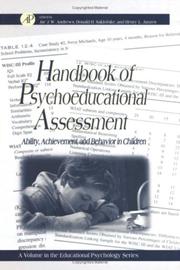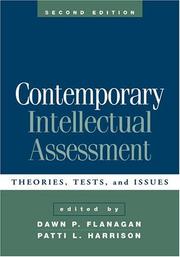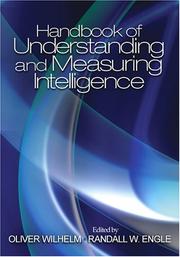| Listing 1 - 10 of 70 | << page >> |
Sort by
|

ISBN: 0120585707 9780120585700 9780080533803 0080533809 6611032584 9786611032586 1281032581 9781281032584 Year: 2001 Publisher: San Diego Academic Press
Abstract | Keywords | Export | Availability | Bookmark
 Loading...
Loading...Choose an application
- Reference Manager
- EndNote
- RefWorks (Direct export to RefWorks)
The Handbook of Psychoeducational Assessment is a practical guide for educational and psychological professionals using norm-referenced tests in the ability, achievement, and behavioral assessment of children. Written by key individuals involved in the construction and evolution of the most widely used tests, this book provides critical information on the nature and scope of commonly used tests, their reliability and validity, administration, scoring and interpretation, and on how the tests may differ and complement each other in their utility with specific populations.Part 1 of
Educational psychology --- Educational tests and measurements --- Intelligence tests --- Intelligence levels --- Intelligence testing --- IQ tests --- Mental tests --- Psychological tests --- Testing

ISBN: 1593851251 Year: 2005 Publisher: New York Guilford
Abstract | Keywords | Export | Availability | Bookmark
 Loading...
Loading...Choose an application
- Reference Manager
- EndNote
- RefWorks (Direct export to RefWorks)
Intelligence tests --- #KVHB:Intelligentietests --- #KVHB:Psychodiagnostiek --- Intelligence levels --- Intelligence testing --- IQ tests --- Mental tests --- Psychological tests --- Testing
Book
ISBN: 9789047001201 Year: 2008 Publisher: Amsterdam Antwerpen Business Contact
Abstract | Keywords | Export | Availability | Bookmark
 Loading...
Loading...Choose an application
- Reference Manager
- EndNote
- RefWorks (Direct export to RefWorks)
Verbale tests: abstracties Verbale tests: taalbeheersing Cijfermatige tests Figurentests Technisch inzicht Ruimtelijk inzicht Snelheid en nauwkeurigheid Andere intelligentietests Oefening: de sleutel tot testsucces
IQ tests --- IQ-bepaling --- Intelligence testing --- Intelligence tests --- Intelligentietests --- Tests d'intelligence --- Problems, exercises, etc. --- departement Algemeen 09 --- psychotechnisch onderzoek --- IQ testen
Book
ISBN: 0128021101 0128020768 9780128021101 9780128020760 Year: 2016 Publisher: Amsterdam, [Netherlands] : Academic Press,
Abstract | Keywords | Export | Availability | Bookmark
 Loading...
Loading...Choose an application
- Reference Manager
- EndNote
- RefWorks (Direct export to RefWorks)
"WJ IV Clinical Use and Interpretation: Scientist-Practitioner Perspectives provides clinical use and interpretive information for clinical practitioners using the Woodcock-Johnson, Fourth Edition (WJ IV). The book discusses how the cognitive, achievement, and oral language batteries are organized, a description of their specific content, a brief review of their psychometric properties, and best practices in interpreting scores on the WJ IV. Coverage includes the predictive validity of its lower order factors and the clinical information that can be derived from its 60 individual subtests. Part II of this book describes the clinical and diagnostic utility of the WJ IV with young children for diagnosing learning disabilities in both school age and adult populations, and for identifying gifted and talented individuals. Additionally, the book discusses the use of the WJ IV with individuals whose culture and language backgrounds differ from those who are native English speakers and who were born and raised in mainstream US culture"--Provided by publisher.
Woodcock-Johnson Tests of Cognitive Ability. --- WJTCA (Psychology) --- Cognition --- Intelligence tests --- Testing --- Intelligence levels --- Intelligence testing --- IQ tests --- Mental tests --- Psychological tests
Book
ISBN: 3456810873 Year: 1981 Publisher: Bern Huber
Abstract | Keywords | Export | Availability | Bookmark
 Loading...
Loading...Choose an application
- Reference Manager
- EndNote
- RefWorks (Direct export to RefWorks)
Intelligence tests --- Problem solving --- Methodology --- Psychology --- Decision making --- Executive functions (Neuropsychology) --- Intelligence levels --- Intelligence testing --- IQ tests --- Mental tests --- Psychological tests --- Testing --- Intelligence tests. --- Problem solving.
Book
ISBN: 3590145234 Year: 1978 Publisher: Dusseldorf Schwann
Abstract | Keywords | Export | Availability | Bookmark
 Loading...
Loading...Choose an application
- Reference Manager
- EndNote
- RefWorks (Direct export to RefWorks)
Intellect --- Intelligence tests --- Intelligence levels --- Intelligence testing --- IQ tests --- Mental tests --- Psychological tests --- Human intelligence --- Intelligence --- Mind --- Ability --- Psychology --- Mental retardation --- Thought and thinking --- Testing --- Intellect. --- Intelligence tests.
Book
ISBN: 9780521861212 0521861217 9780511575907 9781107423558 9780511517853 0511517858 0511575904 0511515324 9780511515323 110719654X 1107423554 1282103806 9786612103803 051151431X 0511516606 051151736X Year: 2009 Publisher: Cambridge [England] New York Cambridge University Press
Abstract | Keywords | Export | Availability | Bookmark
 Loading...
Loading...Choose an application
- Reference Manager
- EndNote
- RefWorks (Direct export to RefWorks)
The field of intelligence testing has been revolutionized by Alan S. Kaufman. He developed the Wechsler Intelligence Scale for Children's Revised (WISC-R) with David Wechsler, and his best-selling book, Intelligent Testing with the WISC-R, introduced the phrase 'intelligent testing'. Kaufman, with his wife, Nadeen, then created his own series of tests: the Kaufman Assessment Battery for Children (K-ABC), the Kaufman Test of Educational Achievement (K-TEA), the Kaufman Brief Intelligence Test (K-BIT), and many others. The K-ABC, the first major intelligence test to challenge the Wechsler, helped raise the bar for future tests. This is a celebration of his life's work, with contributions by a 'who's who' in IQ testing, including Bruce Bracken, Dawn Flanagan, Elaine Fletcher-Janzen, Randy Kamphaus, Nancy Mather, Steve McCallum, Jack Naglieri, Tom Oakland, Cecil Reynolds, and Robert Sternberg, is edited by his son James, and features essays expanding on his work and ideas from former colleagues.
Intelligence tests. --- Kaufman, Alan S., --- Intelligence levels --- Intelligence testing --- IQ tests --- Mental tests --- Psychological tests --- Testing --- Kaufman, Alan S. --- Health Sciences --- Psychiatry & Psychology

ISBN: 1322417695 1452264430 9781452264431 9781452233529 1452233527 9780761928874 0761928871 Year: 2005 Publisher: Thousand Oaks, Calif. Sage Publications
Abstract | Keywords | Export | Availability | Bookmark
 Loading...
Loading...Choose an application
- Reference Manager
- EndNote
- RefWorks (Direct export to RefWorks)
A group of experts from the fields of cognition & methods summarise, review & evaluate research in their areas of expertise. Each chapter presents a particular domain of intelligence research, illustrating & highlighting important methodological considerations, theoretical claims, & pervasive problems in the area.
Intellect. --- Intelligence tests. --- Intelligence levels --- Intelligence testing --- IQ tests --- Mental tests --- Psychological tests --- Human intelligence --- Intelligence --- Mind --- Ability --- Psychology --- Thought and thinking --- Testing --- Psychodiagnostiek --- intelligentieonderzoek.
Book
ISBN: 1282352180 9786612352188 0300142536 9780300142532 9781282352186 9780300123852 030012385X 9780300164626 0300164629 6612352183 Year: 2009 Publisher: New Haven Yale University Press
Abstract | Keywords | Export | Availability | Bookmark
 Loading...
Loading...Choose an application
- Reference Manager
- EndNote
- RefWorks (Direct export to RefWorks)
Critics of intelligence tests-writers such as Robert Sternberg, Howard Gardner, and Daniel Goleman-have argued in recent years that these tests neglect important qualities such as emotion, empathy, and interpersonal skills. However, such critiques imply that though intelligence tests may miss certain key noncognitive areas, they encompass most of what is important in the cognitive domain. In this book, Keith E. Stanovich challenges this widely held assumption.Stanovich shows that IQ tests (or their proxies, such as the SAT) are radically incomplete as measures of cognitive functioning. They fail to assess traits that most people associate with "good thinking," skills such as judgment and decision making. Such cognitive skills are crucial to real-world behavior, affecting the way we plan, evaluate critical evidence, judge risks and probabilities, and make effective decisions. IQ tests fail to assess these skills of rational thought, even though they are measurable cognitive processes. Rational thought is just as important as intelligence, Stanovich argues, and it should be valued as highly as the abilities currently measured on intelligence tests.
Intelligence tests. --- Thought and thinking. --- Mind --- Thinking --- Thoughts --- Educational psychology --- Philosophy --- Psychology --- Intellect --- Logic --- Perception --- Psycholinguistics --- Self --- Intelligence levels --- Intelligence testing --- IQ tests --- Mental tests --- Psychological tests --- Testing
Book
ISBN: 1789551366 9781789551365 Year: 2013 Publisher: Buckingham University of Buckingham Press
Abstract | Keywords | Export | Availability | Bookmark
 Loading...
Loading...Choose an application
- Reference Manager
- EndNote
- RefWorks (Direct export to RefWorks)
Intellect --- Intelligence tests. --- Intelligence levels --- Intelligence testing --- IQ tests --- Mental tests --- Psychological tests --- Human intelligence --- Intelligence --- Mind --- Ability --- Psychology --- Thought and thinking --- Measurement. --- History. --- Testing
| Listing 1 - 10 of 70 | << page >> |
Sort by
|

 Search
Search Feedback
Feedback About UniCat
About UniCat  Help
Help News
News